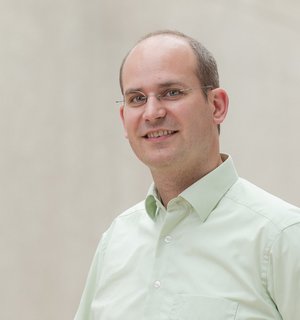The computer scientist Dr. Marc-André Hermanns teaches and conducts research at the RWTH Aachen University. He is intensively involved with the MPI programming scheme and contributed heavily to the optimisation of the fourth major version of the Message Passing Interface, namely MPI 4.0. As Programme Chair he shaped the EuroMPI 2021 conference. In this interview he reveals what interested researchers can expect from the conference, which will take place digitally and at the Leibniz Supercomputing Centre (LRZ) on September 7th and 8th from the subsequent two-day meeting of the international MPI Forum.
"We hope for a lively exchange on the new functionalities of MPI 4.0"

What topics will this year's EuroMPI21 be about?
Dr. Marc-André Hermanns: At this year's conference, we have several contributions on one-sided communication, remote memory access (RMA) and the closely related Communication Progress, as well as the new session concept introduced with MPI 4.0. Furthermore, contributions on topics such as collective communication algorithms and code generation are part of the overall programme.
Why are these topics important right now?
Hermanns: Remote memory access forms the third communication paradigm in MPI alongside point-to-point and collective communication. Changes in MPI 3.0 have made RMA more and more attractive to users. At the same time, applications are becoming more irregular in their behaviour, i.e., they do not always have clear common communication phases, but calculate in their own phases. In order to continue to work efficiently, so-called non-blocking communication can be helpful. In such scenarios, however, their efficiency is strongly dependent on asynchronous "communication progress". The sessions address what I consider to be the important aspect of scalability. When input data becomes larger, one often has to deal with it with more parallelism in order to keep the computing time acceptable. Sessions help to limit the memory consumption of the MPI library while coupling different parts of the simulation. This is new, so everyone should carefully consider usage scenarios and performance.
What criteria for selection did you use as Programme Chair?
Hermanns: We applied a rigorous scientific review process – as usual. The Programme Committee is made up of scientists from the MPI community, each of whom assessed individual contributions, gave them a grade, so to speak, and from the average of all the assessments, the contributions that convinced most experts were included in the programme.
Of course, each contribution is highly relevant – but are you looking forward to any highlights that particularly interest you?
Hermanns: I myself have dealt intensively with the interface for one-way communication or remote memory access. So far, this has been more of a niche topic. That's why I'm particularly pleased that there are several contributions on this topic this year. The Best Paper this year is about Communication Progress. The contributions on the new sessions concept are also exciting. A new area is opening up here that shows that MPI and its development are far from being conclusively researched.
You analyse MPI as a researcher - what exactly? And what do you find interesting about the programming scheme?
Hermanns: I am particularly interested in performance analysis tools with a focus on MPI and other interfaces for parallel programming with distributed memory. So far, the focus has been on methods to detect waiting times at synchronisation points of one-way communication. Users often do not realise that, depending on the implementation, they are implicitly synchronising two processes with a remote memory access. Therefore, developers of tools and interfaces should consider what problems might arise and how they can inform users about them. What fascinates me here is the trade-off between information and performance. The more information I try to capture at runtime, the higher the risk of influencing the behaviour of the programme I am measuring and falsifying my measurement data. Researchers should therefore weigh up where and how they capture information. They should be particularly attentive in interface design, as this contributes significantly to success.
After 6 years of preparation, version 4.0 of MPI has now been released. What improvements does it bring to HPC?
Hermanns: With MPI 4.0, new functions have been created to be able to send very large amounts of data easily. MPI 4.0 also introduces persistent collective communication. The concept can increase efficiency in iterative simulations and has now been extended to collective communication. The "Partitioned Communcation" concept introduces a new method for point-to-point communication. It enables an MPI library to send parts of the data before all of it is completely available. Hybrid programming, i.e., mixing MPI with a thread-based interface, is becoming more important, and partitioned communication can be helpful in this context. With the sessions, the initialisation of the MPI library has been modernised. In the area of virtual topologies, some functionality has been added to make it easier to adapt an application to the existing hardware architecture of an HPC system. The first methods for runtime handling of critical errors have also been integrated, because up to now the entire MPI programme was aborted after the failure of a process, for example. Programmed with MPI 4.0, an application can handle some errors itself. I myself worked on the extension of the MPI Tool Information Interface or MPI_T; we designed a callback-based interface that closes a gap in the recording of performance information.
What expectations do you associate with EuroMPI21?
Hermanns: With a view to MPI 4.0, I hope for a lively discussion on the new functions of MPI and how they will be received by users. It will be interesting to see what direction the forum will take in order to implement the users' wishes in the future.
And which ones with the host LRZ?
Hermanns: The last visit to the LRZ was some years ago, I was looking forward to coming to Garching again. Unfortunately, the pandemic made this impossible. Often the venue creates its very own atmosphere, because researchers from the region can get involved without any effort. But that's the great opportunity of virtual conferences - it enables easy participation worldwide.